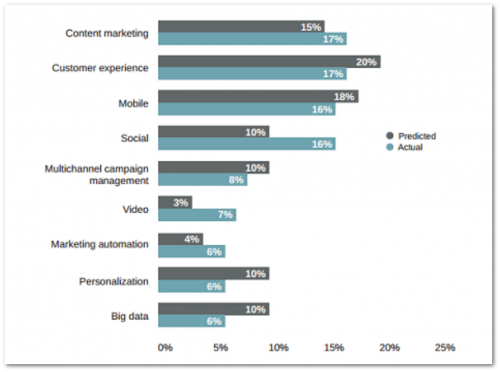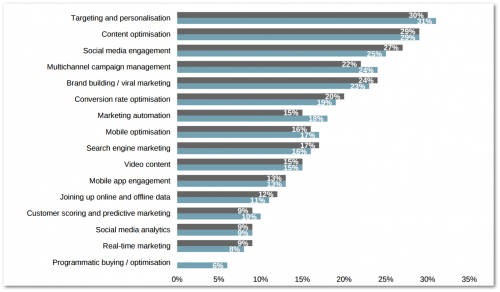January is usually the time where people are the most reflective. Gyms are flooded by people who'll turn up once and then pay their bills for the rest of the year, pubs start to fear no one will drink ever again while others will have smoked the last cigarette of their lives. What better time to look back at the digital trend predictions of the past and see what we can learn from them. In case you didn't know, Adobe produce an annual digital trends report in which they review what new ideas they think people should focus on and review which of their previous year's predictions were correct.

The above graph compares 2014s predicted trends against the actual trends. Most of the listed trends aren't really that useful for helping us to stay ahead of the curb for web development, however, there are some useful insights. When it comes to making websites, writing good content in a clear straightforward manner is probably a given. A website will only ever be popular if it has good compelling content. Without good content, there's probably very little gain you can makeover your competition. Writing good content on a consistent basis is key to success.
Respoinsice Websites
Based on my experiences, every client has either converted their site or wants their site to be mobile optimized. If you're reading this and your website still isn't responsive, that should be a primary focus for the upcoming year. Out of the trends on any report, I think the most exciting opportunities are the ones that your competitors aren't looking at. Video, Personalization, Big Data and Marketing Automation seemed to be the big emerging trends of 2015.
These trends definitely fit into how the industry has changed this year. Sitecore's main focus in version 8 was the DMS and real-time Analytics. This new feature lets Marketers track stats across all of their omnichannel... or in normal talk, your email campaigns and your website. Episerver has gone one step further and brought Perius, a company that will not only read your website's analytics but will send your customer's personalized information based on their browsing history, this is definitely a clever move. Instead of you having to decide how best to target your customer with your data, they will take the stress from you and do it automatically. In addition to this, Episerver has also spent the year focusing on introducing A/B testing out-of-the-box within its core CMS product. Web experimentation seems likes it will be a big emerging trend moving forwards.
Video
Video is another trend that companies seem to be focusing on. This year I've had several video agencies contact me which has never happened before. I think that is a sign that engaging video content will replace standard content in the next few years.
Companies like Dropbox made big strides focusing on video content. Instead of writing content, Dropbox used video on their landing page to explain their offering. They used a simple explainer video which increased their sign up rate by 10%. They now have over 100 million users, the video landing page can be attributed to 10 million of them! The retail company Zappos used video descriptions and demos to increase conversions on each of their products by 6-30%, which they later sold to Amazon for over $1bn.

Personalisation
The 2016 table clearly shows that personalisation and content optimization have definitely won in the emerging trends war and that's more than likely what your competition will be focusing on in their 2017 strategy. Personalisation is definitely what the main CMS platforms are focusing on. Episerver CMS and Sitecore CMS can both handle personalisation pretty well, however, Umbraco CMS is still way behind the curve with personalisation.
It does kind of worry me that content marketing has completely dropped off the radar. In my opinion, no matter who you are, writing good content is still one of the most important things you can do to gain an audience. It seems in the last year there have definitely been some big steps forward to allow companies to help improve their conversions and after all, every business needs to make money, so this is kind of obvious.
I've recently been reading a book called Hacking Marketing by Scott Brinker. In the book, Scott discusses the non-stop change the IT industry has always had to deal with, and how this frequent change in technology is also something marketers will have to face in the future. Looking at the 2016 graph, you can definitely see an explosion of new platforms and ideas people will need to keep up to date with. New social platforms, mobile, search engine marketing, video, content optimization, it's a lot to take on board in a relatively short space of time. That's one of the reasons I think managing omnichannel marketing has risen so quickly in importance for companies. It is also the main reason why it will continue to be one of the leading trends in the upcoming few years.
When the concept of mobile-first started, every company had to re-platform or re-design their website so it worked on any device. In the future, companies will likely have to go through the same headaches with their data. In the future, more and more companies will want a single place to manage all of their content, across all their marketing channels. At the minute Sitecore is the only provider to really provide this functionality and I would expect others to follow suit at some point.
What Should I Focus On In 2017?
If we go from the 2014 list, the things that became the next big thing, were the items at the bottom of the list of the previous year. Looking at the 2016 list, customer scoring and predictive marketing, social media analytics, real-time marketing, and programmatic optimization are at the bottom of this years list. Will these be the next big thing?
In this digital experience age, these trends feel like they will become more important. As mentioned above, Episerver has recently bought a company that will provide programmatic optimization into the commerce and CMS platform with very little development work required. This feature will be released and improved throughout 2017. Sitecore has had great real-time analytics built into version 8 for over a year, so if you have either of these platforms you'll be in a great space to get going with these trends. Personally, programmatic optimization is the thing I would recommend focusing on. As there are so many new platforms and the world is constantly moving, looking at stats after a customer interaction will always put you behind the curve compared to something that's doing it automatically in real-time. No matter how quickly you look at data and set-up tests, an automated algorithm will always be able to outwork you.
What do you think the trends will be in the coming year, leave your comments below. Happy Coding 🤘
